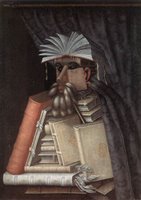"Literacy in American Lives" Questions
Questions for Discussion from Group 1:
1. What is the important influence of library on literacy in history
and present? As a librarian, how can we help people improve their literacy?
2. Is it possible to define levels of literacy and is there a point where the
pace outweighs the curve so that the older we get the more difficult it is
to move forward?
3. With the internet age are we putting new emphasis on writing but in specific
way which will lead the next generation to internet specific literacy
skills?
4. Brandt mentions how unequal access to computers is a new source of
inequality when it comes to being informed and exercising civil and
economic rights. Are we doing anything to address this problem? If
not, what should we be doing to make sure that people don't get left
behind as computer knowledge becomes an increasingly important skill?
5. How are American families supported to assist their children to
achieve in light of our country's high standards for literacy,
especially when the very children who most need information literacy
are often from families that are the least likely to have learning
experiences which will promote these abilities?
Are schools and libraries even having thoughtful dialogues about
information literacy for children when building curriculum, programming
organizational missions and policies?
Are teachers and libraries working together on the issue? Should they?
6. How does our idea of information literacy affect people who speak
languages other then English? Should there be different set of rules to
teach information literacy to families from other cultures?
7. It is hard to put a grade on someone's thoughts and feelings.
Especially when the person is a young, impressionable and sensitive
child. Could this be a hindrance to educators when teaching writing?

